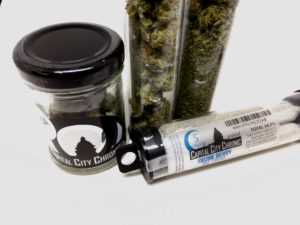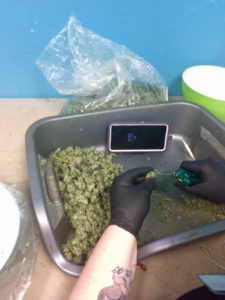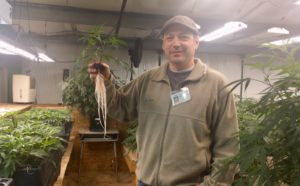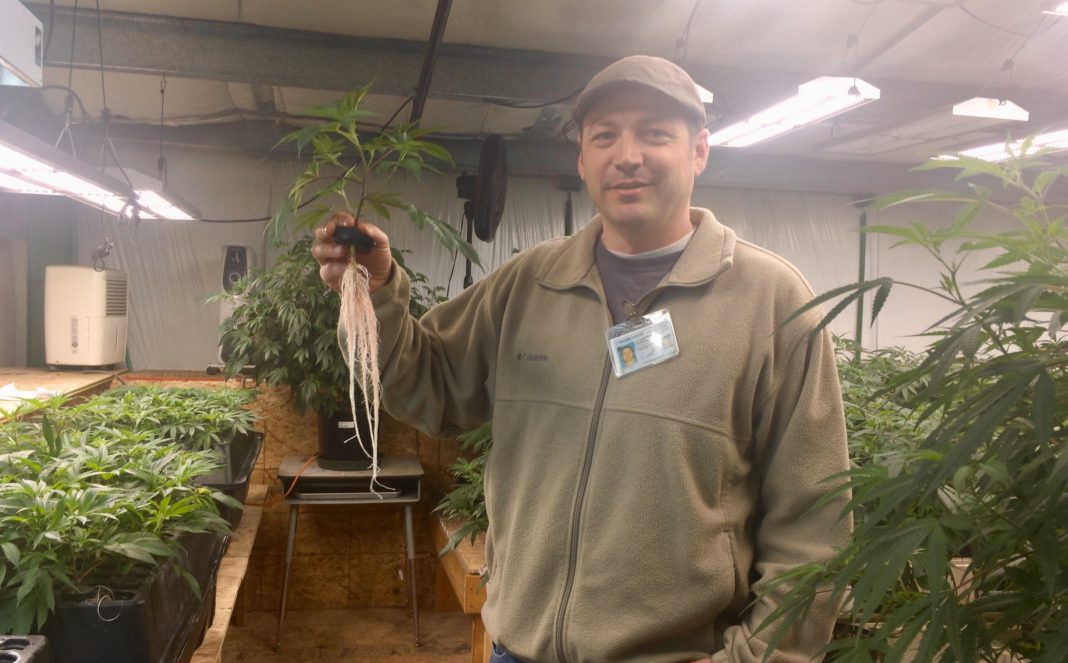Disclaimer: This article is intended for readers age 21 and older.
It’s early, before sunrise, and Clyde Stephenson Jr. moves silently through the house to begin his day. In the dark morning hours, he makes his way out the door, careful to not disturb his sleeping wife and two daughters. Like many American farmers, Clyde works long hours. He knows a lot about his crop, soil needs and nutrition, and pests. But there is something that sets Clyde apart from other farmers. In fact, most people don’t call Clyde a farmer at all. They call him a grower.

Clyde grows cannabis.
While average American farmers head off to massive fields of corn, wheat, or other food crops, Clyde heads to a warehouse district just off of highway 101. The inside of the warehouse is divided into different rooms, which allow the growing, processing, and packaging of Capital City Chronic’s cannabis products. Unlike food crops, cannabis is strictly regulated.
There are many things that make working in the cannabis industry different than working in other industries around Washington. However, for all the differences, there quite a few similarities.
Capital City Chronic is a family business. That is similar to the traditional American small scale farm, and pretty common among many other small businesses. Clyde, the owner of Capital City Chronic, employs family members and trusted friends. In order to spend time with his wife and children, he goes into work very early in the mornings. “It was a promise I made to myself and my family,” he says, “that I would be there for my kids when they got home from school every day.”

Photo credit: Holly Reed
Clyde’s small family business competes with growers large and small across Washington. Current trends suggest that the industry favors larger production operations, which Washington State breaks down into tiers. Tier one operations are allowed to have a growth canopy of up to 2,000 square feet. Tier two operations are a bit larger, allowing between 2,000 square feet and 10,000 square feet. Tier three is the largest, allowing a growth canopy of up to 30,000 square feet, and the larger production operations are using every inch of that space.
“It’s somewhat like the difference between a microbrewery and a large beer manufacturer,” says Clyde, “tier one and tier two growers know every single plant they grow.” Clyde thinks that once the public knows about the differences in the tier sizes, they could take that information into consideration when they are deciding between brands to purchase. When consumers shop, it is often difficult to discern between the small-scale tier one and two growers, and the larger tier three producers on the shelf. But as customers become familiar with his brand, Clyde hopes to win them over with high quality, increasing his regular customer base and demand for his product at different retailers.
Capital City Chronic sells many cannabis varieties at Gypsy Greens in West Olympia. “Clyde is probably our number one seller,” says Jeremy Howard, manager for Gypsy Greens. Jeremy loves working with Clyde because of his high level of professionalism and reliability. He continues, “He is really easy to work with, and in this business, that means everything to me.”

Photo credit: Holly Reed
Competing against large operations can be a challenge, so Clyde has looked for ways to minimize expenses. One of the largest expenses growers incur is energy consumption in the form of grow lights. Farmers across America have a deep understanding of their crops, literally down to a science, and cannabis growing is no exception.
Clyde’s crops need 18 hours of light for maximum growth potential, which simulates spring and summer growth seasons. He switches to 12 hour days when he wants the green leafy plants to bud and produce flowers, which happens in the fall. Powering grow lights is expensive, but Clyde reduced his cost, using a grant available from Puget Sound Energy to switch from high pressure sodium (HPS) lights to the more energy efficient LED lights. This change cut his energy consumption by a third.
To purchase one of the products Clyde grows, visit Gypsy Greens at 234 Division Street Northwest in Olympia. To see more about Clyde’s products, check out the Capital City Chronic’s Facebook page, or to view all the products Gypsy Greens offers, pop over to their website.
Warning: This product has intoxicating effects and may be habit forming. Marijuana can impair concentration, coordination, and judgment. Do not operate a vehicle or machinery under the influence of this drug. There may be health risks associated with consumption of this product. For use only by adults twenty-one and older. Keep out of the reach of children.
Sponsored





















































